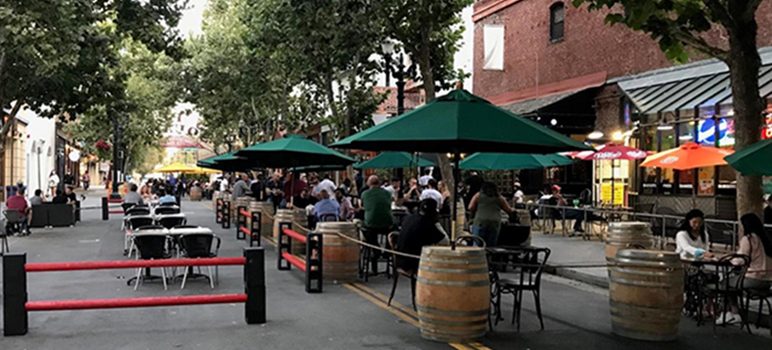Parklets have arguably been the most notable change to our streets since the start of the pandemic. With indoor dining shuttered, businesses have taken their activities outside; spilling into the roads. Once relegated to the realm of urban activists, parklets have dotted streets across the city and the nation.
But as “parklet” has become a new buzzword for business improvement districts and politicians, something essential to its character has been transformed.
The first parklets, created by the arts community in San Francisco, bear virtually no resemblance to the ones we see sprouting up on streets today. These initial parklets were created by local activist groups who saw an opportunity to convert under-utilized asphalt into truly public space: locally managed, and open to all. This initial experiment spawned the Park(ing) Day movement, a “gateway drug for urban transformation” which turned the dead space of vacant parking into public parks.
The same can’t be said of the recent parklet revival—in San Jose and across the country.
The marketing for San Jose’s “Al Fresco” program, which allowed businesses to conduct operations on street parking, has been entirely focused on the role of the parklet in aiding businesses (which, in these times, is certainly an admirable goal).
On-street parklets are also funded exclusively by private businesses to the tune of thousands of dollars, creating a commercialized atmosphere within the parklet and an expectation to buy. Furthermore, parklets are not open 24/7, unlike other public parks.
Sure, the land may be technically owned by the city, but parklets are both managed and paid for by private businesses. And if public land is nearly entirely under private stewardship, is it really public?
And therein lies the problem.
It certainly is lovely to see our scarce public space repurposed for people, often in creative ways. But one can’t escape the feeling that the Al Fresco program constitutes nothing more than a wholesale abandonment of the idea of the public commons in an effort to solve a difficult problem.
The fact that San Jose makes it illegal for teenagers to be on the street at night or for somebody to so much as sit on a public sidewalk makes this wholesale privatization all the more ironic. So, while “undesirables” can be subjected to police harassment for merely looking suspicious in a public place, businesses are allowed to effectively take over public land for their own interests.
The hypocrisy is glaring.
With that said, the benefits of the parklet program for local businesses and restaurants are undeniable. But the social benefits of the parklet can not come at the cost of continued privatization. Publicly, or even communally, managed parklets would foster an inclusive atmosphere for everyone, allow businesses to operate during the pandemic, and keep public land in the hands of the public.
Through the pandemic, the concept of the parklet has come into contact with the forces of cash-strapped businesses and a government willing to sacrifice anything to prop them up, and has been twisted and reframed in their image.
Cities have relegated parklets to the influence of private capital rather than making them resident-focused beautification of public space.
Turning our streets into better places for businesses and residents of all stripes—not just customers—is a good thing. But making our city more beautiful can not come at the cost of sacrificing public land for private profit.
Gil Rodan is a San Jose resident, writer and activist. Opinions are the author’s own and do not necessarily reflect those of San Jose Inside. Send op-ed pitches to
co******@me*******.com
" target="_blank" rel="noopener noreferrer">
co******@me*******.com
.


“And if public land is nearly entirely under private stewardship, is it really public?”
No, it’s not. They should be paying land rent to the city and thus its residents. And…with that land rent will come the agreement to all the ‘rights’ of a renter (30 days notice to pack up and go if the city and it’s residents want their space back.)
Or, we could be a generous, understanding, compassionate and grateful city and realize how lucky we are these businesses are busting their *ss trying to stay in business and SERVING the public during this once in a century challenge.
I’m for letting them stay rent free for now.
You said it, Jill. Small businesses provide tax dollars to keep all your favorite government amenities going. They’re being throttled by poor policy right now, and making extra demands would be foolish. You want more free sidewalk, Mr. Rodan? Check out the empty storefronts, I’m sure there’s some there.
> These initial parklets were created by local activist groups . . .
Just what the hell is an “activists” anyway?
What are the rights and privileges of an activists?
What are their “obligations” and “liabilities”?
Can I sue an “activists” for harm or damages or disturbing the peace, or just being annoying and obnoxious?
How do I collect?
Do activists have to have a license or a certification or pass any kind of exam?
Why the hell should anybody give a crap what any “activist” thinks?
It’s just a mythical concept which empowers a few people to be “free lance” virtue signalers without any consequences.
baaahahaha
the city would collapse without sales tax
property tax barely breaks even, do you people not read?
what do you think the 1.3 jobs to homes fantasy is about? corporate tax?
its about funding public sector pensions with sales tax
goodness to be ignorant must be so blissful, you probably think we will get to unity through cracking down on domestic terrorists
turn off msnbc
1.3 hobs to homes is a fantasy, Google village or Diridon area included.
(Everyone knows some change from jobs to housing is likely, and those open space public sites are great candidates for housing of all kinds, and does San Jose and the county have various special needs of all kinds of housing in mind.)
https://sanjosespotlight.com/google-project-wont-improve-san-joses-jobs-housing-imbalance-officials-say/